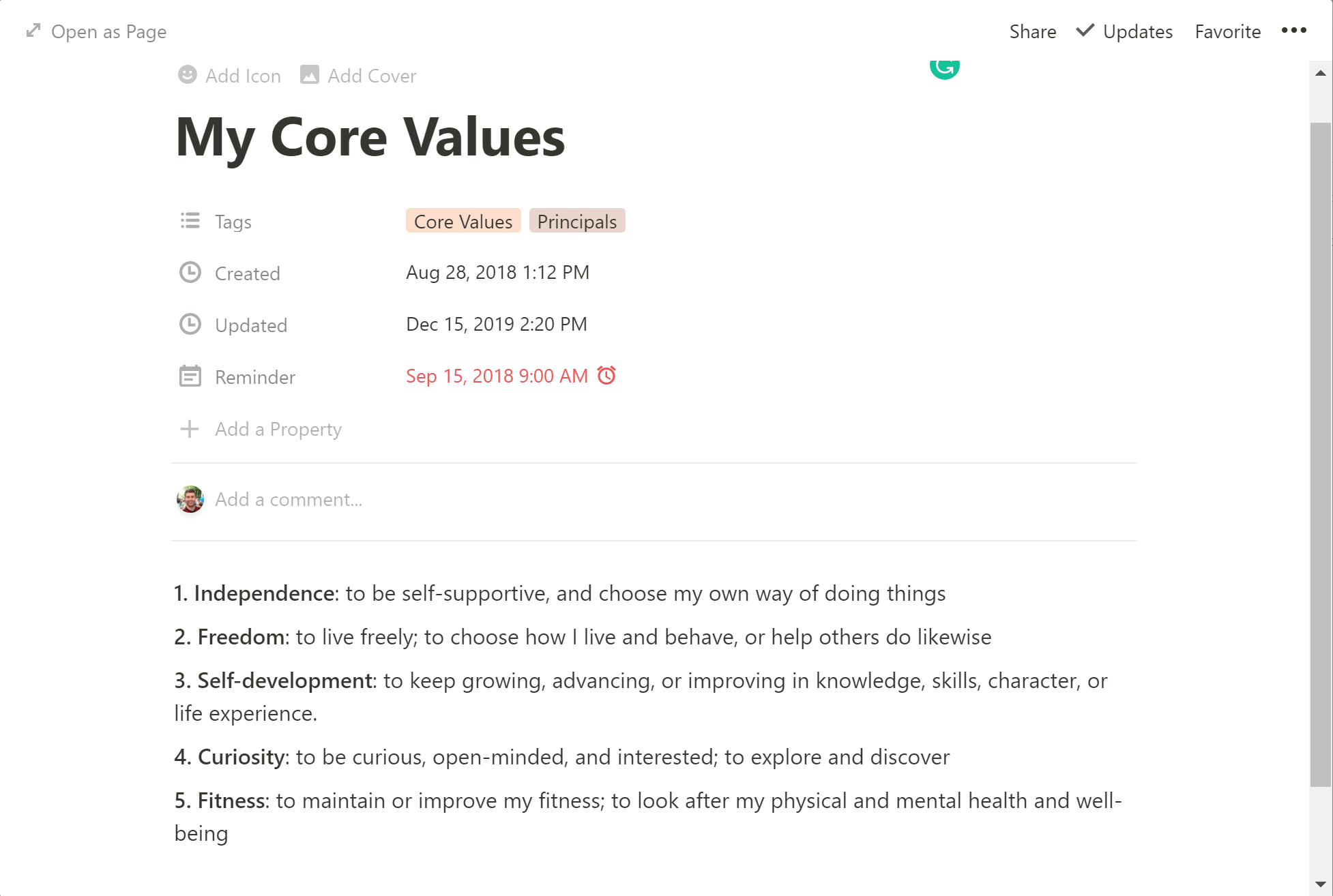How often do you find yourself struggling to make an important decision? Perhaps it’s a major life decision such as moving to a new city or switching career paths. You weigh the pros and cons of your decision but the answer is never quite clear.
You desire a sense of purpose but seem to be stuck in neutral as you witness others pass you by. You have become reactive to the events in your life instead of proactively engaging with them that best aligns with what is most important to you. Success seems obtainable but the blueprint is not quite clear.
So what separates those that are successful in life from everyone else? All successful people have values that help them achieve their goals. Their values provide a framework for decision making that can be relied on instead of defaulting to their emotional state when a difficult decision is needed to be made. So if you want to make better decisions in your own life, then it is necessary to first understand your core values.
What Are Core Values?
To be honest, I don’t like the term “core values”. The term seems to be often tainted by organizations and governments that plaster them on billboards and posters for positive PR but fail to adhere to them. But whether or not you acknowledge the term, everyone holds a set of core values (or personal values) that guide them through their life.
Your core values are what you truly believe. They are not what you are expected to believe, be it from your parents, teachers or culture. They are derived from our personal experiences that help shape how we come to view the world. To know your core values is to know what is most important in your life.
If you are constantly making decisions based off of external circumstances and peer pressure then you are living a life determined by other people’s expectations instead of your own. Maybe you have a vague idea about what you value, but you have never put in serious thought about what they actually are. When you don’t have your core values explicitly defined, you default to your emotions to make the decisions for you.
So how do you define your values? Chances are, you already have adopted many values from other sources in your life such as from religion, culture and the societal norms of your time. These values are often rooted in wisdom and have been vetted over time, but you would be doing yourself a disservice to blindly adhere to what you were taught without careful self-examination.
Defining Your Core Values
This is a time for private self-reflection. I recommend that you grab a pen and paper and give yourself 20 minutes to think deeply about this (Seriously, stop reading and grab a pen and paper before you continue).
To get a better understanding of what you truly value you need to reflect on what gives you a sense of self-worth and adds structure to your life. In other words, what is truly important to you? Think back to when you have felt fulfilled or when you are the happiest. That means that if something is important to you, write it down. It doesn’t matter if it’s not socially acceptable or what you want other’s to think of you. It’s important that you be honest with yourself. Your goal is to determine your top five most important core values. Do not go over five values, if you think everything is important then nothing is actually important.
After you have narrowed your list down to your top five, it is time to prioritize them from most important to least important. It isn’t uncommon for your core values to complement each other but it is still necessary to rank them to help you get a better understanding of what is most important to you.
To help guide you in this exercise, I have listed my own personal list as well as 58 example values below that you can pick from (but feel free to create your own if they are more applicable). Once you have established your list, feel free to modify it based off of your own experiences. This is only meant to serve as a springboard for your mind to think about what your core values are at this stage in your life. There are no right or wrong answers and it is likely that your values will change along with your goals and expectations as you age.
My Core Values

As you can see from my list, I currently value making decisions in life that will allow me more freedom in the future (whether it be when, where, how and what I work on). I also value self-development, which is a big reason why I started this blog. I have found that the act of hashing my thoughts out on paper is the only way for me to organize my monkey mind and decipher what it is I actually want in life. My physical fitness is also of high importance to me since it allows me the ability to pursue peak mental performance in the work that I do.
So from reading my top five list, you can gather that I highly value my personal education to provide my future self with the necessary skills to succeed. My ideal form of success is to be able to control what I get to work on in life. It is this luxury of pursuing curiosities about myself and the world around me that is my ultimate pursuit.
Core Values List
- Acceptance: to be open to and accepting of myself, others, life, etc.
- Adventure: to be adventurous; to actively seek, create, or explore novel or stimulating experiences
- Assertiveness: to respectfully stand up for my rights and request what I want
- Authenticity: to be authentic, genuine, and real; to be true to myself
- Beauty: to appreciate, create, nurture, or cultivate beauty in myself, others, the environment, etc.
- Caring: to be caring toward myself, others, the environment, etc.
- Challenge: to keep challenging myself to grow, learn, and improve
- Compassion: to act with kindness toward those who are suffering
- Conformity: to be respectful and obedient of rules and obligations
- Connection: to engage fully in whatever I am doing, and be fully present with others
- Contribution: to contribute, help, assist, or make a positive difference to myself or others
- Cooperation: to be cooperative and collaborative with others
- Courage: to be courageous or brave; to persist in the face of fear, threat, or difficulty
- Creativity: to be creative or innovative
- Curiosity: to be curious, open-minded, and interested; to explore and discover
- Encouragement: to encourage and reward behavior that I value in myself or others
- Equality: to treat others as equal to myself, and vice versa
- Excitement: to seek, create, and engage in activities that are exciting, stimulating, or thrilling
- Fairness: to be fair to myself or others
- Fitness: to maintain or improve my fitness; to look after my physical and mental health and well-being
- Flexibility: to adjust and adapt readily to changing circumstances
- Forgiveness: to be forgiving toward myself or others
- Freedom: to live freely; to choose how I live and behave, or help others do likewise
- Friendliness: to be friendly, companionable, or agreeable toward others
- Fun: to be fun-loving; to seek, create, and engage in fun-filled activities
- Generosity: to be generous, sharing, and giving, to myself or others
- Gratitude: to be grateful for and appreciative of the positive aspects of myself, others, and life
- Honesty: to be honest, truthful, and sincere with myself and others
- Humility: to be humble or modest; to let my achievements speak for themselves
- Humor: to see and appreciate the humorous side of life
- Independence: to be self-supportive, and choose my own way of doing things
- Industry: to be industrious, hard-working, and dedicated
- Intimacy: to open up, reveal, and share myself — emotionally or physically — in my close personal relationships
- Justice: to uphold justice and fairness
- Kindness: to be kind, compassionate, considerate, nurturing, or caring toward myself or others
- Love: to act lovingly or affectionately toward myself or others
- Mindfulness: to be conscious of, open to, and curious about my here-and-now experience
- Open-mindedness: to think things through, see things from others’ points of view, and weigh evidence fairly
- Order: to be orderly and organized
- Patience: to wait calmly for what I want
- Persistence: to continue resolutely, despite problems or difficulties
- Pleasure: to create and give pleasure to myself or others
- Power: to strongly influence or wield authority over others, e.g., taking charge, leading, organizing
- Reciprocity: to build relationships in which there is a fair balance of giving and taking
- Respect: to be respectful toward myself or others; to be polite, be considerate and show positive regard
- Responsibility: to be responsible and accountable for my actions
- Romance: to be romantic; to display and express love or strong affection
- Safety: to secure, protect, or ensure safety of myself or others
- Self-awareness: to be aware of my own thoughts, feelings, and actions
- Self-care: to look after my health and well-being, and get my needs met
- Self-control: to act in accordance with my own ideals
- Self-development: to keep growing, advancing, or improving in knowledge, skills, character, or life experience.
- Sensuality: to create, explore, and enjoy experiences that stimulate the five senses
- Sexuality: to explore or express my sexuality
- Skillfulness: to continually practice and improve my skills, and apply myself fully when using them
- Spirituality: to connect with things bigger than myself
- Supportiveness: to be supportive, helpful, encouraging, and available to myself or others
- Trust: to be trustworthy; to be loyal, faithful, sincere, and reliable
How to Make Better Decisions
Now that you have your top five values written down, it is important that you have them saved somewhere so that you can review them in the future. I have mine written down on an index card that’s taped to my mirror as well as in Evernote so that I always have access to them. My goal is to read them every morning so that they naturally become ingrained in my mind.
These values provide me a mental framework to base future decisions off of instead of defaulting to my emotional state of the moment. They also work as a proverbial GPS, making sure that my life stays on track with my values and self-identity.
Once you have a clear understanding of what is important to you, it becomes much easier to start taking daily action to live a purpose-filled life aligned with your values. By constraining yourself to five values, you actually open yourself up to freely pursue what you ultimately desire. These values will give you the foundation to build a more productive and successful life – one decision at a time.

